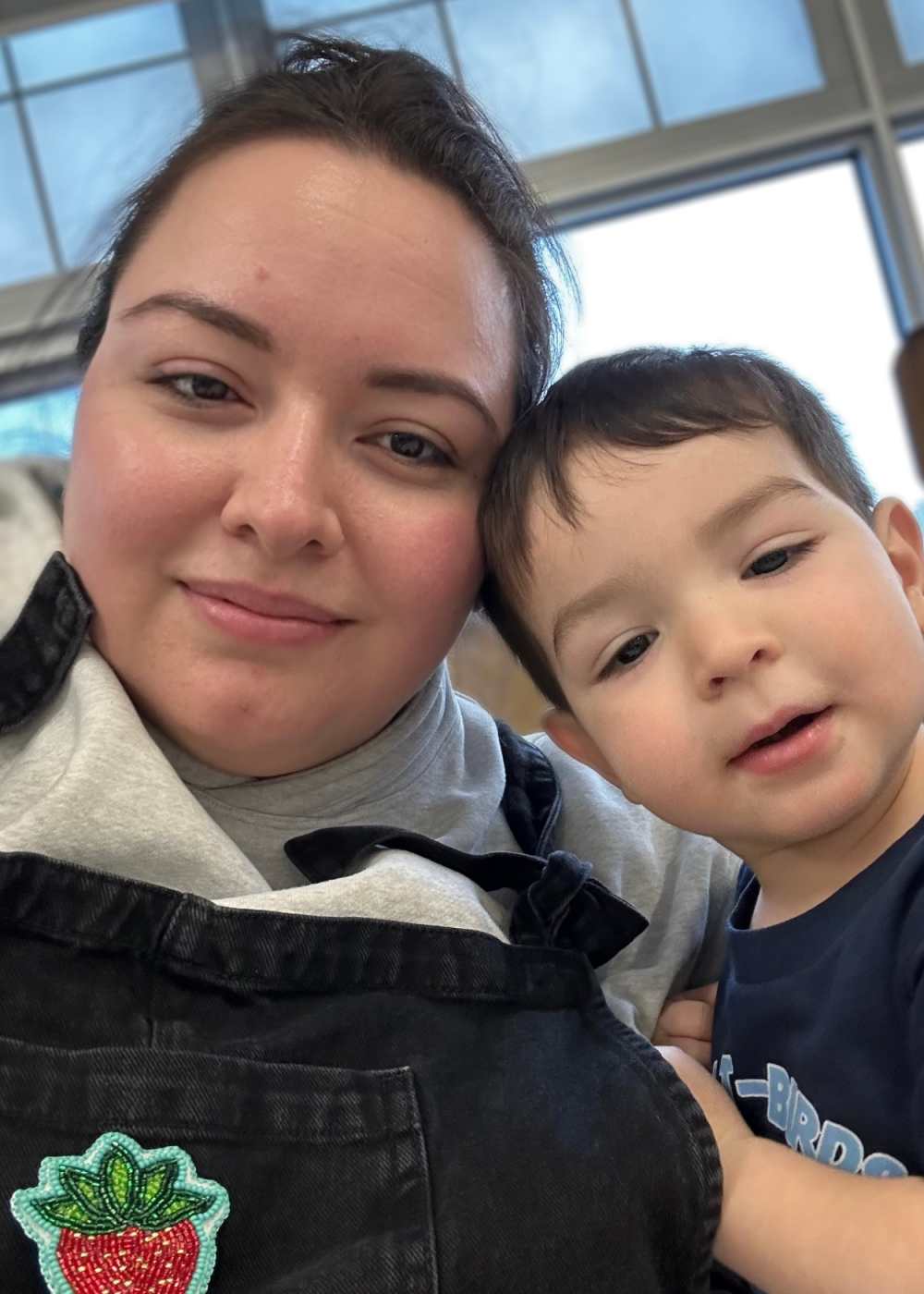Vanier Scholarship recipient explores “big auntie energy” in education
Faculty of Education - 24 June 2024
 What is "big auntie energy"?
What is "big auntie energy"?
Megan Tipler, a Métis educator and PhD student in Secondary Education, says she has experienced the impact of 'big auntie energy' in abundance while working and learning alongside Indigenous women.
Her understanding of the role of aunties deepened with the birth of her nephew in August 2021, just before beginning her graduate studies. The timing of his arrival, coupled with a resonant question from kehteya (Elder) Bob Cardinal: 'kikway enohte ohpinaman?' (What are you trying to lift?), prompted her to reflect deeply on her duties as an auntie.
"In nehiyawewin, the term for my aunt, or my mother’s sister is more accurately translated to 'my little mother,’ which implies a shared responsibility to nurture and uplift young ones,” Tipler says.
These understandings influenced Tipler's personal life and professional path as she transitioned from classroom teaching to serving as a program support coordinator for the Aboriginal Teacher Education Program (ATEP). Before accepting the position, she reached out to a friend and ATEP graduate who shared her experiences in the program.
"She talked about the Cree aunties who loved on her, kept her motivated and held her accountable,” Tipler says. "She also talked about the importance of representation and how inspiring it was to see Indigenous women with PhDs."
Tipler witnessed the powerful 'big auntie energy' at ATEP firsthand, guided by its director, Dr. Evelyn Steinhauer, and the nurturing presence of aunties in an academic setting. The holistic approach to nurturing students differed from her experiences as a secondary school teacher.
"Every ATEP auntie has unique gifts, and there is a collaborative effort to support students, unlike the Western education system, where there is typically one authority figure standing at the front of the room," she notes.
Tipler completed her Bachelor of Education at the University of Alberta in 2014 and wished she had that network as an undergraduate student. However, the community she has found in her graduate studies has been essential to her growth as an educator and researcher. Reflecting on her unexpected journey to a PhD, Tipler credits the support she received from Indigenous scholars and community members.
“I'm grateful for the expertise people have generously shared, especially those who shared their knowledge of nehiyawewin. As a beginner, I'm committed to learning and expanding my understanding, but I can't do this without guidance,” she says.
Tipler's time at the U of A has also included a role in the Office of the Vice-Provost, Indigenous Programming & Research. Working alongside Dr. Florence Glanfield and Nella Sajlovic underscored the relentless and often unrecognized efforts of Indigenous aunties within the university, who continually advocate for Indigenous students, staff and faculty, she says.
"One of our projects involved drafting the guidelines for Indigenous Ceremonial Practices, affirming our inherent right to engage in cultural practices on campus. Shana Dion initiated that conversation, which really hit home for me after an incident where a fellow graduate student called campus police on me for smudging in my office," she says. "It was frustrating, but seeing how many people worked together to craft and review those guidelines gives me hope."
Currently, Tipler is co-instructing the final course for the inaugural cohort of ATEP MES students, set to convocate this fall. She also serves as a research assistant to Dr. Dwayne Donald and Dr. Trudy Cardinal on their projects, Reimagining Teacher Education with Indigenous Wisdom Traditions and Braiding Stories to Live By. Additionally, she is involved in a review of EDU 211, and later this summer, she will co-instruct a course with Dr. Cardinal as part of the Summer Institute in Teaching Foundational Indigenous Knowledge.
Making space for “blooming and blossoming”
Inspired by her personal and professional experiences, Tipler is set to embark on a research project entitled Big auntie energy: Storying sâkihitowin and experiences of Indigenous aunties as a pathway for reimagining and rematriating educational practices, which the prestigious Vanier Canada Graduate Scholarship recently funded.
"The simple translation of sâkihitowin is love, but when you break down the meaning, it relates to the blooming and blossoming that occurs in the springtime and the creation process emerging at that time. My experience in the Faculty of Education has involved a lot of blooming and blossoming. It hasn't always been pretty, and sometimes it's been painful, but so many people around me have nurtured a little seed, making this possible."
The Vanier Canada Graduate Scholarship program aims to attract and retain world-class doctoral students by supporting students who demonstrate leadership skills and a high standard of scholarly achievement in graduate studies in the social sciences and humanities, natural sciences and/or engineering and health.
"I want to interview and work with academic aunties, Cree and Métis women who are in-service teachers, and work with women Knowledge-holders in Treaty 6 and have those conversations together, constructing those responses together, thinking about what it means to be an auntie and what our responsibilities to children are."
Tipler's work reflects a deep commitment to living the values she researches. She hopes her work is a reflection and extension of the community that has helped sustain her. She aims to support future generations like she is supported, embodying the transformative potential of 'big auntie energy' in education.
"There are so many people who have modelled these concepts; they haven't just talked about them," she says. "I want to honour all the aunties I've encountered and follow in their footsteps to do the same for those coming behind me."
Photo caption: Education PhD student Megan Tipler with her nephew Noah Tipler, whose birth in 2021 prompted her to reflect deeply on her duties as an auntie.